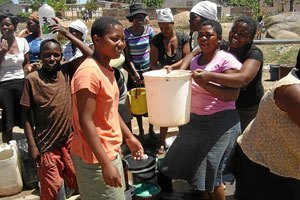
MOST of the boreholes drilled by non-governmental organisations (NGOs) in Harare’s high- density suburbs at the height of the cholera epidemic three years ago, have broken down, forcing residents to fetch water from unprotected sources again.
Report by Edgar Gweshe This scenario exposes residents to water-borne diseases at a time when there are reports of sporadic cases of typhoid, dysentery and other diarrhoeal diseases in the city.
Some of the boreholes were drilled with the assistance of Unicef and were a respite for most residents who were reeling from the effects of erratic water supplies.
The residents last week attributed the continuing breakdown of the boreholes to overuse and lack of proper maintenance.
A local residents’ body, the Harare Residents Trust (HRT) said water crisis was most pronounced in Mbare, Kuwadzana and Dzivarasekwa where residents queue for long hours for water at unprotected sources.
HRT advocacy officer, Pretty Chabuda said there was an urgent need for responsible authorities to ensure action was taken to address the situation. The situation is dire at Mbare’s Nenyere, Matererini and Joburg Flats where several families live in single rooms, subdivided by curtains.
HRT said in areas of Kuwadzana 1 to 4, there was only one functioning borehole at a clinic located in section 4, which is also servicing residents of Crowborough.
“Residents of Kuwadzana extension are using one borehole which is located at Kuwadzana 8 Primary School. In Dzivarasekwa 1, 2, 3 and 4, only one borehole is functioning in each of these areas and the situation is very critical,” said Chabuda.
- Chamisa under fire over US$120K donation
- Mavhunga puts DeMbare into Chibuku quarterfinals
- Pension funds bet on Cabora Bassa oilfields
- Councils defy govt fire tender directive
Keep Reading
Given the high population density in these areas, there was need for swift action to prevent a disease outbreak.
“As you might be aware, most residents had resorted to these boreholes for their water supply but because they are constantly breaking down, the water situation in Mbare, Kuwadzana and Dzivarasekwa is now erratic and action needs to be taken to address this,” she said.
Council spokesperson, Lesley Gwindi said they were in the process of repairing all broken down boreholes, but blamed residents for failing to exercise a sense of responsibility resulting in vandalism of the boreholes.
“We are currently looking into the situation especially in Dzivarasekwa and we will continue doing so with every other affected suburb,” said Gwindi.
“However, I think people should learn to exercise a sense of responsibility over their assets because they are the ones vandalising these boreholes and the next thing they do is to point fingers at the city council. Even if you put a bin, the next thing; it’s stolen and what is that?”











